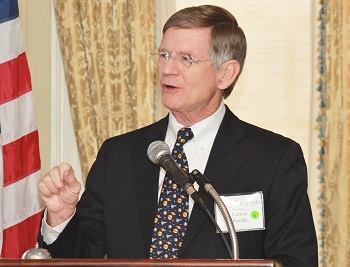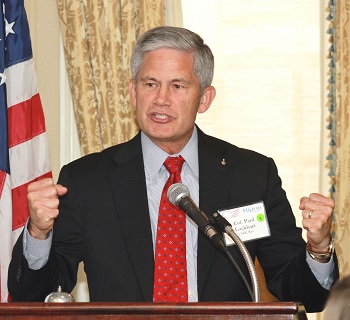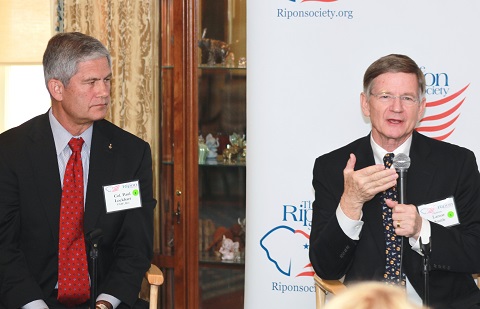Joined by astronaut Paul Lockhart, House Science Committee Chairman welcomes private sector’s role in exploration and says America needs to think “beyond the Moon”

WASHINGTON, DC – “I don’t know whether space is the last frontier or not. But I certainly believe it is the next frontier.”
With those words, Texas Congressman Lamar Smith kicked off a presentation to The Ripon Society yesterday morning, a presentation in which he not only talked about the importance of space exploration, but the benefits the space program has brought to people here at home.
Smith serves as Chairman of the House Science, Space and Technology Committee. Appointed to this position by his colleagues in November 2012, he recently won passage of the NASA Authorization Act of 2014, which was approved by the Science Committee with unanimous bipartisan support last month.
“Today’s bill ensures that NASA will continue to innovate and inspire,” Smith said at the time. “The scientists, engineers and astronauts who find creative and new solutions to the challenges of exploring the universe serve as role models for our students. NASA has accomplished some of the most awe-inspiring and technologically advanced space initiatives in the history of humankind.”
The Science Committee Chairman talked about some of these initiatives in his presentation to The Ripon Society and the technological “spin-offs” that have been developed as a result of America’s exploration of space. “We don’t justify the space program by these spin-offs,” he said. “But it’s a nice side effect. Spin-offs include GPS, high definition TV, laser surgery, Doppler weather radar, and a lot of other discoveries – all of which benefit the economy and our society, as well.”

Chairman Smith was joined in his presentation to The Ripon Society by Colonel Paul Lockhart, a former astronaut and veteran of two Space Shuttle missions. In his remarks, Lockhart echoed the Chairman’s enthusiasm about the U.S. space program, and said it was critical that the program not only have adequate funding, but a clear set of goals.
“Something as big and expansive as our nation’s space program should have big and expansive goals to get there,” Lockhart stated. “Otherwise you don’t have that perseverance to do it. I saw that in the Space Station program. When I got there in 1996, I knew what our goal was — to build the premier orbiting platform called the International Space Station. We knew what our goal was, and we also had a roadmap. Big programs that are dangerous and breathtaking in scope have to have clearly defined goals and a roadmap to get there.”
Lockhart, who served as a fighter pilot in the Air Force before becoming an astronaut in 1996, also spoke of another reason he believes the U.S. must continue its investment and presence in space. “As somebody who was in the Armed Forces,” he stated, “I think the number one reason why we have to have a robust and strong space program is to maintain America’s preeminence in space. Space is really not a place. It’s a capability that has to be grown and developed, and something that helps our nation be robust in other areas.”
In response to a question about reinvigorating America’s commitment to space exploration, both Lockhart and Smith were similarly blunt about the steps that need to be taken in that regard.

“I think what’s missing is a defined goal,” the former astronaut said. “Is it going back to the Moon? Is it going to Mars? Is it going to an asteroid and bringing it back? What is the actual defined goal? And that is about leadership. The nation has to come together under strong leadership.”
Smith concurred.
“We really don’t have a plan, we don’t have a goal, we don’t have anything right now to seize the public’s imagination like Apollo did or the Space Station did,” he observed. “I wish the Administration would help out in that regard. But they have opposed the asteroid retrieval system. They are neither funding it, nor do we have a specific asteroid in mind, nor do we have a launch date, nor do we even have a budget. I have proposed a Mars fly-by to take place in 2021. I do think Mars is the obvious next step. We’ve been to the Moon, that’s not to say we shouldn’t go back to the Moon. But we have to think beyond the Moon, too.”
The Ripon Society is a public policy organization that was founded in 1962 and takes its name from the town where the Republican Party was born in 1854 – Ripon, Wisconsin. One of the main goals of The Ripon Society is to promote the ideas and principles that have made America great and contributed to the GOP’s success. These ideas include keeping our nation secure, keeping taxes low and having a federal government that is smaller, smarter and more accountable to the people.



